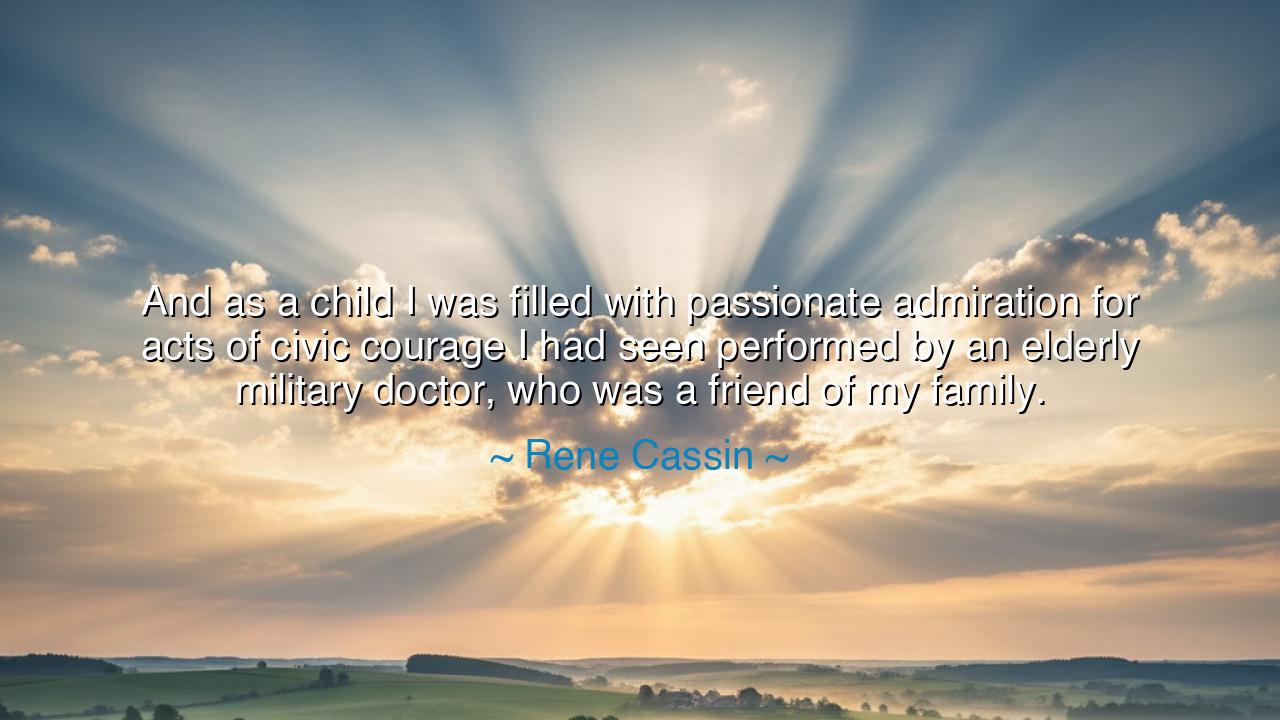
And as a child I was filled with passionate admiration for acts
And as a child I was filled with passionate admiration for acts of civic courage I had seen performed by an elderly military doctor, who was a friend of my family.






The philosopher and jurist René Cassin, one of the noble architects of the Universal Declaration of Human Rights, once said: “And as a child I was filled with passionate admiration for acts of civic courage I had seen performed by an elderly military doctor, who was a friend of my family.” In these tender words, Cassin reveals the spark from which his lifelong devotion to justice and humanity was kindled. It is not a declaration of doctrine, but a remembrance—a confession that the greatness of a man’s future often begins in the silent impressions of his youth. In the courage of another, he glimpsed the possibility of moral heroism, and from that seed grew one of the fiercest defenders of human dignity the world has ever known.
The meaning of this quote reaches far beyond the simplicity of memory. Cassin speaks of civic courage—the strength not of soldiers on the battlefield, but of citizens who stand firm for conscience and justice. The “elderly military doctor” was not a hero of conquest but of compassion, one who dared to act rightly in times of danger or indifference. To a young boy, such quiet valor becomes a sacred lesson: that bravery is not confined to war, and that the truest courage often shines in service to others. Cassin’s admiration was not for victory, but for virtue—for the power of one soul’s integrity to inspire another.
The origin of Cassin’s insight lies in the fires of history itself. Born in France in 1887, he grew up in a nation still scarred by the memory of war, and later lived through the horrors of two world conflicts. He served in the First World War and was grievously wounded. Yet his greatest battles were not fought with weapons, but with words—with laws, ideas, and compassion. When the Second World War came, Cassin joined Charles de Gaulle in the Free French movement, resisting tyranny not through violence, but through the moral courage to stand for liberty when France itself had fallen silent. The example of that old military doctor, whose courage was measured in quiet deeds, lived on in Cassin’s soul; it became the inner compass that guided his fight for humanity’s freedom.
There is in this story a universal truth: that the examples we witness in youth carve deep and lasting paths within us. A single act of integrity can echo through generations. The child who sees courage learns that fear can be overcome. The child who witnesses compassion learns that the world can be healed. History offers countless such examples. Consider Mahatma Gandhi, whose early encounter with injustice in South Africa transformed him into a prophet of nonviolence. Or Eleanor Roosevelt, who watched her uncle Theodore lead with bold moral conviction and later became the voice of conscience for the oppressed. In each of these lives, as in Cassin’s, admiration became vocation—and the seed of courage matured into a tree of justice.
What makes Cassin’s reflection especially moving is his acknowledgment that the gift was unintentional. The old doctor did not set out to inspire; he simply lived according to his conscience. And yet, his actions shaped the destiny of one who would go on to shape the world. This reminds us that greatness is often born from the unnoticed. Our deeds—especially our steadfastness in times of adversity—may awaken the hearts of others in ways we never see. Every act of courage, no matter how small, may become the beginning of another’s purpose.
The lesson, then, is twofold. First, we must look with reverence upon the examples of moral courage that surround us, and let them guide our lives. But second—and more importantly—we must become those examples ourselves. We must live in such a way that our courage, our fairness, our humanity might awaken the same passionate admiration in others that Cassin once felt as a child. The true legacy of courage is not glory, but transmission—the passing of light from one heart to another.
So, walk with civic courage, even when the world seems indifferent. Defend what is just, protect the weak, and act with quiet strength in the face of fear. For you never know whose eyes are watching, whose spirit you may awaken. Remember the words of René Cassin: that even a single act of goodness can plant a seed of greatness in another. Let your life be such a seed—a living testament that the greatest gift one can give the world is not wealth, nor knowledge, but the courage to be good when goodness costs everything.






AAdministratorAdministrator
Welcome, honored guests. Please leave a comment, we will respond soon